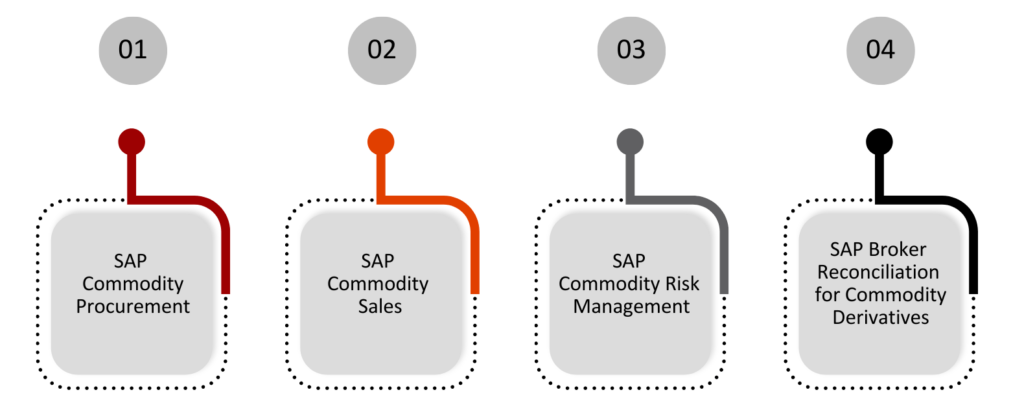SAP Commodity Management | Modules & Features

In today’s volatile markets, effective commodity management can be crucial to a company’s success. However, reducing the risks associated with commodity trading, futures, and ongoing position management can be a significant challenge for buyers of commodities ranging from agricultural products to precious metals.
The fact is that the ERP software that serves as the backbone of many businesses has historically been insufficient for dealing with the unique challenges of the commodities trading industry. As a result, firms are compelled to manage commodity trading risks and exposure using complicated spreadsheets or separate commodity trading systems, which adds complexity, duplicates work, and increases the possibility of error.
What if there is a better way?
SAP Commodity Management
Many businesses are unaware that their existing SAP ERP system includes significant commodity management features that can revolutionize how the organization handles commodity risk. These built-in features eliminate the need for time-consuming spreadsheets and intricate interfaces between your commodities trading system and ERP system.
SAP Commodity Management enables businesses of any size or industry to better forecast and manage the risk of commodity purchases and holdings. With SAP’s integrated commodities risk management solution as part of your ERP, your company can rapidly and simply detect, measure, and minimize risk exposure.
- Pricing of Commodities
Commodity pricing precision is critical for sustaining competitiveness and optimizing profit margins. SAP Commodity Management enables organizations to develop effective pricing plans by analyzing market trends, historical data, and other pertinent aspects. Traders can simply design and update price models to correspond with market dynamics using a user-friendly interface, ensuring that pricing choices are flexible and responsive.
- Market Data Administration
The essential component of commodities trading is accurate and timely market data. SAP Commodity Management offers seamless integration with several market data sources, giving traders real-time market trends, prices, and other important data. The cloud-based design enables speedy updates and guarantees that traders have access to the most recent market knowledge, allowing them to make educated decisions.
- Analytics for Commodity Risk
Commodity markets are notoriously unpredictable, exposing businesses to a variety of risks. SAP Commodity Management integrates powerful analytics capabilities to efficiently identify and minimize these risks. Organizations can identify possible risks and execute methods to hedge against adverse market movements by exploiting historical data and market knowledge. The solution’s cloud-based architecture ensures that risk analytics are constantly adjusted based on real-time data.
- Period-End Valuation
For financial reporting and risk management, accurate valuation of commodity portfolios after specified periods is critical. SAP Commodity Management automates the period-end valuation process, decreasing the possibility of mistakes and maintaining accounting standards compliance. The cloud-based platform enables organizations to extend their valuation procedures as needed, allowing them to accommodate increasing and changing commodity portfolios.
Modules of SAP Commodity Management

- SAP Commodity Procurement:
SAP Commodity Procurement is an end-to-end software solution designed to streamline and simplify the complex process of procuring commodities. It provides solutions for managing and optimizing the procurement workflow in the commodities business.
➔ Generate procurement contracts based on market-based pricing bids for them.
➔ Automate provisional, differential, and final bills, and conduct invoice simulations
➔ Save time and improve accuracy by automating price calculations
➔ Eliminate “out of system” computations and provide clear invoice receipts for purchases.
➔ Receive a single version of the truth with full audit assistance.
- SAP Commodity Sales:
SAP Commodity Sales is a software module that successfully manages the complete sales process for commodities or commodities-dependent products. It provides efficient handling of commodities sales transactions from start to finish.
➔ Generate sales contracts based on market-based price quotations.
➔ Run invoice simulations and automate provisional, differential, and final invoices.
➔ Decrease revenue leakage caused by invoice miscalculations.
➔ By automating pricing computations, you may save time and enhance accuracy.
➔ Receive a single version of the truth with full audit assistance.
- SAP Commodity Risk Management:
SAP Commodity Risk Management is a software solution that reliably detects, monitors, and manages risk exposures linked with commodity price swings across varied business processes. It assists firms in anticipating and reducing potential hazards.
➔ Manage and mitigate market risk caused by commodity price volatility efficiently.
➔ Get a real-time picture of combined physical and financial commodities positions.
➔ Streamline treasury procedures and lower the resources needed to perform them.
➔ Maintain conformity with the most recent accounting rules.
➔ Receive a single version of the truth with full audit assistance.
- SAP Broker Reconciliation for Commodity Derivatives:
SAP Broker Reconciliation for Commodity Derivatives is a technology that contributes to financial stability by automating the comparison and reconciliation of commodity derivatives. This provides exact calculation of derivative holdings, improving financial reporting accuracy.
➔ Reduce the need for human interaction by automating time-consuming reconciliation operations and investigating and resolving irregularities.
➔ Reduce your commodities risk exposure by identifying missing and incorrect transactions and holdings more effectively.
➔ Use a standardized cloud solution to provide rapid, efficient, and accurate commodities trade and position reconciliation.
Key Features of SAP Commodity Management
- Infrastructure on the Cloud
Moving commodity management to the cloud provides remarkable flexibility and scalability. Cloud-based solutions, such as SAP Commodity Management on SAP S/4HANA Cloud, enable businesses to swiftly adjust to changing market circumstances, expand resources as needed, and access data from any location with an internet connection.
- Reporting and compliance
Commodity trading requires strict adherence to industry regulations. SAP Commodity Management assists organizations in staying on top of evolving compliance requirements while also simplifying the reporting process and ensuring that all transactions fulfil regulatory criteria.
- Reporting and compliance
Commodity trading requires strict adherence to industry regulations. SAP Commodity Management assists organizations in staying on top of evolving compliance requirements while also simplifying the reporting process and ensuring that all transactions fulfil regulatory criteria.
- Contract Management Centralized
SAP Commodity Management provides a single platform for the creation, management, and monitoring of physical contracts. This centralized method guarantees that all stakeholders have real-time access to contract facts, lowering the chance of errors and increasing contract visibility overall.
- Collaboration in Real Time
SAP Commodity Management’s cloud-based architecture promotes real-time communication across internal teams and external partners. Stakeholders can work together seamlessly while negotiating contracts, tracking shipments, or maintaining documents, enhancing communication and decreasing delays.
- Improve currency risk and exposure management.
The SAP Treasury module enables your company to improve treasury activities and better manage risks associated with currency fluctuations and commodities futures. You can run a complete analysis fast identifying long or short positions and where your organization is vulnerable by connecting data from the commodities price engine with the treasury module.
- Analytics and risk management
Commodity trading relies heavily on understanding and minimizing risks. SAP Commodity Management includes comprehensive analytics capabilities that enable businesses to identify market risks, monitor commodity prices, and make informed decisions to mitigate possible losses.
- Reporting and compliance
Commodity trading requires strict adherence to industry regulations. SAP Commodity Management assists organizations in staying on top of evolving compliance requirements while also simplifying the reporting process and ensuring that all transactions fulfil regulatory criteria.
- Increase visibility within the organization.
Data in spreadsheets, separate commodities management systems, or other solutions frequently leads to a lack of visibility for the CFO and others, posing internal controls risks and auditability difficulties. You can examine your physical and financial commodity holdings in real time with SAP Commodity Management, establishing a “single version of the truth” without contradictory data from numerous systems.
- Improve your ability to forecast commodity prices.
SAP’s integrated commodity pricing engine provides a competitive edge to your company. The engine develops and applies forward curves using live market data to better estimate future pricing, closing price, average price, or other critical characteristics. This powerful engine not only helps you to decrease risk associated with commodity price volatility and build procurement contracts based on market-based price quotations, but it also allows you to tailor your models to the precise pricing terms applicable to your commodity contracts.
Last Thought:
SAP Commodity Management’s cloud-centric strategy is a game changer for commodity trading organizations. The platform enables businesses to operate more effectively, lower risks, and remain ahead in the volatile world of commodities markets by automating important activities such as commodity procurement, commodity sales, commodity risk management, and broker reconciliation for commodity derivatives. SAP Commodity Management delivers a scalable and future-proof solution for organizations wishing to revolutionize their commodity trading processes.
For specialized guidance and assistance, reach out to KaarTech. Our team of experts is ready to support you. Feel free to share your thoughts and experiences in the comments below as we value your insights.
FAQ’s
What are the Key features of SAP Commodity Management?
SAP Commodity Management improves commodity price accuracy by analyzing market trends, historical data, and other variables. Traders may develop and update price models in a flexible manner, assuring competitiveness and optimized profit margins.
Why is commodity management important in today’s volatile markets?
Competent commodities management is critical for a company’s profitability in volatile markets. It reduces the risks involved with commodities trading, futures, and position management.
How does SAP Commodity Management differ from traditional ERP solutions?
SAP Commodity Management transforms how organizations manage commodity risk by leveraging current SAP ERP systems. It eliminates the need for cumbersome spreadsheets and interfaces while providing integrated functionality for predicting, managing, and mitigating commodity risk.
What industries can benefit from SAP Commodity Management?
SAP Commodity Management is versatile and beneficial for companies across various industries, including agriculture, manufacturing, and finance.
